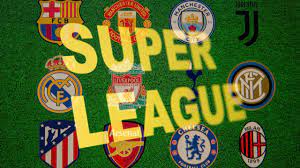The battle for European football diplomacy saw a major development on Thursday (Dec 21) after the European Court of Justice (ECJ) delivered its verdict on the blocking of the European Super League (ESL) terming the act as ‘unlawful’. With the football world divided in Europe, the friction between UEFA (European football’s governing body) and the ESL is now at a breaking point as top teams could be on their way out of the premier competitions like Champions League and Europa League.
Thank you for reading this post, don't forget to subscribe!In April 2021, a top cluster of continental clubs came together to form the ESL which included the likes of Real Madrid and Barcelona along with the ‘big six’ Premier League sides. The cluster also included the likes of Juventus, Inter Milan and AC Milan before the plan was scrapped amid big protests by fans. Upon criticism, 10 of the 12 clubs pulled out of the European Super League while UEFA decided to levy hefty fines on them. Spanish giants Real Madrid and Barcelona though did not back out and are still part of the plan.
ALSO READ | Football: Manchester City win maiden FIFA Club World Cup
How does the current European format work?
A concept originated from the original Champions League platform, the ESL aims at developing a league structure for top European clubs. Currently, in the Champions League, a club from one European nation can compete against another only in the group stages or a knockout match. A group is only restricted to four teams, which totals six matchdays. Therefore, not multiple top clubs from Europe can compete in the same group (except a few groups).
ESL’s structure
With the ESL on the rise, it aims to provide a platform for top European clubs to compete in a league structure where multiple teams can compete on a more regular basis. If the current project is sanctioned and top teams across Europe participate in it, these teams will compete on a more regular basis than just meeting in the Champions League.
Practically, Real Madrid vs Manchester United, a fixture that has taken place once in the last decade will be on the calendar every season as both teams will be part of the same league structure. Currently, only teams that are part of the same country’s league structure can meet every season while teams part of a different country’s league structure only meet in the Champions League or the Europa League.
How will the ESL work?
As announced on Thursday, 64 teams will be part of the ESL and will be divided into three categories. These categories are Gold (top division), Silver (second division) and Blue (third division). The Gold and Silver Leagues will see the inclusion of 16 teams each while Blue League will have 32 teams.
Star – the top league – would involve 16 clubs, grouped into two teams of eight.
Gold – the second league – would be the same.
Blue – the third league – would have 32 teams, grouped into four teams of eight.
All leagues would play 14 matches per team – seven home and seven away.
The knockout stage
In the men’s and women’s competitions, the top four teams from each group in the Star and Gold league will go through to the quarter-finals, meaning eight teams in each tier compete in the knockout stages.
There would also be an eight-team knockout stage in the men’s Blue league, with the top two teams in each group going through to the quarter-finals.
Who was part of the European Super League?
Currently, only Real Madrid and Barcelona are part of the plan as mentioned with other teams pulling out due to fan criticism. The cluster consisted of six Premier League giants – Manchester City, Manchester United, Chelsea, Liverpool, Arsenal and Tottenham Hotspur. On the flip side, after Thursday’s verdict Chelsea, Tottenham and Arsenal have announced to not support the ESL and will continue to work with UEFA.
The cluster included Atletico Madrid as one of three Spanish teams to be part of the ESL while three Italian sides – Inter Milan, AC Milan and Juventus were part of the league structure. However, there is no clear stand taken by any other club apart from the Premier League sides, which have kept their cards regarding ESL close to their chest.
No club from Germany and France were part of the plan in the initial phase of the competition but the ESL could approach them since the Premier League sides are likely to pull out.
If the proposed plan of the ESL goes forward, it could be a major player in European football while there are also shouts for a unified world league which could see teams across different continents compete in the same structure.
You can now write for Baazigarnews.com and be a part of the Baazigar family. Share your stories and opinions with us here.






